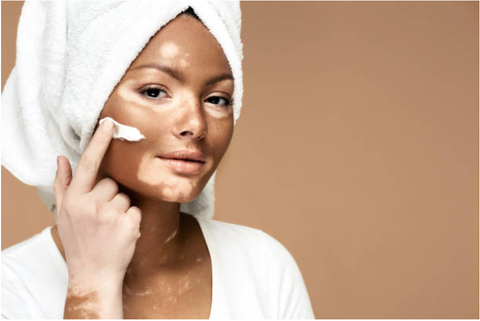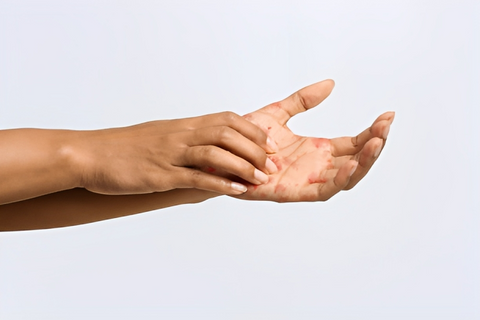Finding the perfect moisturiser for oily skin feels like navigating a labyrinth of trial and error. Because yes, oily skin needs moisture and hydration.
Most moisturisers make your skin even greasier and can even lead to breakouts. That’s why it’s very important to know how to choose the right moisturiser for your oily skin.
There lies a trove of solutions to find the right moisturiser for oily skin to reach a shine-free complexion.
What is oily skin?
Oily skin is characterised by its proclivity to produce excess sebum, resulting in your skin being greasier prone to clogged your pores and acne eruptions.
Oily skin origins are of causes as varied as stress, humidity, hormones, and from genetic predispositions to environmental influences, and even the occasional indulgence in fried food.
Types of moisturisers for oily skin
There are so many different types of moisturisers, each bearing unique attributes tailored to address oily skin's complexities. But how do moisturisers work?
-
Emollient-Based Moisturisers - Emollient based moisturisers contain lipids and oils that fill up cracks and spaces in the skin, resulting in a smooth appearance. These moisturisers repair skin barriers and are great for all skin types.
When it comes to choosing emollient-based moisturisers for oily skin look for ingredients like lanolin, shea butter, squalane, grape seed oils, ceramides and rosehip.
-
Humectant-Based Moisturisers - Humectant-based moisturisers are suitable for all skin types. A humectant draws moisture from the air and helps bind water on the surface of the skin keeping your skin hydrating. The best? They are lightweight and get absorbed quickly.
When it comes to choosing humectant-based moisturisers, opt for ingredients like hyaluronic acid, glycerin, honey, aloe vera, sodium lactate, sorbitol, and urea, renowned for their lightweight embrace. All great for your oily skin.
What to look for in a moisturiser when buying it for oily skin?
When looking for the ultimate ally against oily skin, knowledge and discernment are key. Hunt for formulations devoid of oil, water-based and imbued with a Lightweight texture.
Seek ingredients that reduce excess oil, and eschew comedogenic (doesn’t clog pores, prevent black- and whiteheads) and acnegenic (doesn’t cause acne) compounds.
Always apply SPF skincare to protect your skin from the sun.
What ingredients to look for in a moisturiser for oily skin?
Often perceived as a problem, oily skin harbours numerous benefits when properly tended to. The key lies in understanding its unique needs and discerning the ideal ingredients to incorporate into your skincare routine. Below, a selection of top-tier ingredients tailored to oily skin's needs and requirements.
Dimethicone mimics the properties in oils but leaves your skin dry and smooth after using it. A helpful alternative to oil-free moisturiser.
Glycolic Acid is a must-have ingredient if you are prone to breakouts as it prevents skin clogging and eats away the dead skin cells.
Hyaluronic Acid retains natural moisture and prevents water loss, preserving skin's hydration and vitality. One of the best ingredients for oily skin.
Niacinamide is a derivative of Vitamin B3, supports fortifying the barrier function of the skin by locking in moisture. It also stimulates the skin’s rate of surface renewal and aids damaged skin cells, repairing the ravages of time. A great ingredient in moisturiser for oily skin!
Retinol is a derivative of Vitamin A, increases collagen production and tightens skin pores.
Jojoba Oil mimics natural sebum and tricking skin into less oil production while nurturing balance the pH levels of the skin.
Grapeseed Oil gets absorbed quickly and leaves skin velvety and soft. Its antimicrobial properties clear acne and prevent breakouts.
Hazelnut Oil is great for skin health as packed with antioxidants, gets absorbed fast and helps balance out oil production.
Salicylic Acid is recommended especially for acne-prone skin as it penetrates the pores, removes oil, helps slough off old skin cells and reduces pore size.
How to moisturise oily skin?
For those with oily skin, moisturiser might seem like a foe, but that's a misconception. Surprisingly, moisturiser reduces visible grease and shine. Without it, your skin risks dehydration, prompting it to overproduce oil in compensation.- Avoid mineral oil, coconut oil or silicone-based products. Steer clear of their burdensome embrace as they tend to be heavy on oily skin and may even cause breakouts.
- Apply moisturiser on slightly damp skin for better application, faster absorption and radiant allure.
- Spread your moisturiser to your visage and neck in the ritual, fostering uniform suppleness and luminosity.
- Pair your moisturiser with a gentle cleanser or face wash for hydrated, supple and glowing skin.
Embrace moisture
Even oily skin types must incorporate a moisturiser in their daily skincare routine. A moisturiser will help you to turn your dream of having a healthy, luminous and happy skin into reality.
You might think that moisturiser is your enemy, but believe it’s not. Moisturisers actually help cut down on visible grease and shine from the skin.
Skipping moisturiser will not only make your skin dehydrated but will also produce even more oil.
So, don't be afraid to try multiple products until you find one that is the best one for you. However, if you have sensitive oily skin consult your dermatologist first.





Comments (0)
There are no comments for this article. Be the first one to leave a message!